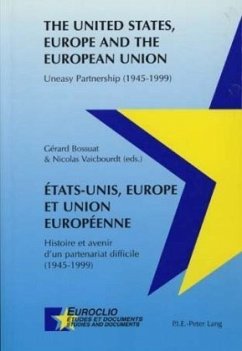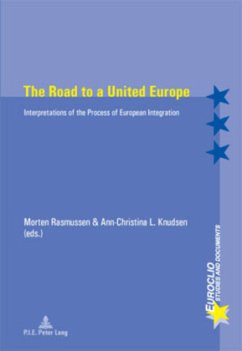
Changing Times: Germany in 20 th -Century Europe- Les temps qui changent : L'Allemagne dans l'Europe du 20 e siècle
Continuity, Evolution and Breakdowns- Continuité, évolution et rupture
Herausgegeben: Elvert, Jürgen; Schirmann, Sylvain
Versandkostenfrei!
Versandfertig in 6-10 Tagen
83,10 €
inkl. MwSt.

PAYBACK Punkte
0 °P sammeln!
Proceedings of the doctoral summer seminar, "Changing times. Germany in 20 th -Century Europe: Continuity, Evolution and Breakdowns", organised by the European Academy of Yuste Foundation in cooperation with the SEGEI network, in the Royal Monastery of Yuste and Palace of Charles V (10 th -15 th September 2007).Actes du séminaire doctoral d'été, " Les temps qui changent. L'Allemagne dans l'Europe du 20 e siècle : Continuité, évolution et rupture ", organisé par la Fondation Académie Européenne de Yuste et le réseau SEGEI dans le Monastère Royal de Yuste et le Palais de Charles Quint...
Proceedings of the doctoral summer seminar, "Changing times. Germany in 20 th -Century Europe: Continuity, Evolution and Breakdowns", organised by the European Academy of Yuste Foundation in cooperation with the SEGEI network, in the Royal Monastery of Yuste and Palace of Charles V (10 th -15 th September 2007).
Actes du séminaire doctoral d'été, " Les temps qui changent. L'Allemagne dans l'Europe du 20 e siècle : Continuité, évolution et rupture ", organisé par la Fondation Académie Européenne de Yuste et le réseau SEGEI dans le Monastère Royal de Yuste et le Palais de Charles Quint (du 10 au 15 septembre 2007).
Actes du séminaire doctoral d'été, " Les temps qui changent. L'Allemagne dans l'Europe du 20 e siècle : Continuité, évolution et rupture ", organisé par la Fondation Académie Européenne de Yuste et le réseau SEGEI dans le Monastère Royal de Yuste et le Palais de Charles Quint (du 10 au 15 septembre 2007).












